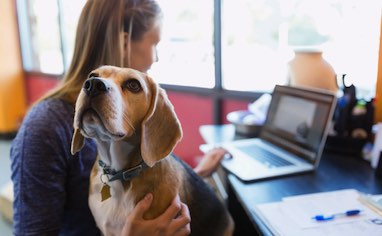Facility Dog

Facility Dog Information
Facility Dogs typically serve in medical, education and legal environments. They are sometimes referred to as Therapy Dogs, but one distinction between Facility and Therapy Dogs is that the handler of a Facility Dog is not a volunteer but rather a professional working in one of these environments.
Common settings for Facility Dogs include: education (often for at-risk or special needs students), legal/courtroom, law enforcement offices, child advocacy centers/organizations, occupational/physical/speech therapy, and counseling/mental health.
Skye’s Dog Training offers training options such as group classes and private training sessions to help clients reach their goals of working with their dog as a Facility Dog.
Training Program
Most clients will choose to work towards the goal of working with their dog as a Facility Dog by taking a series of group training classes. Skye’s Dog Training suggests clients take Beginning Pet Manners, Intermediate, Advanced and Out on the Town (field trip) classes to work towards good public behavior.
Clients may also choose to train with their dogs in private training sessions to work on specific skills and tasks that may be needed for the job.
Facility Dog Assessment
Skye’s Dog Training offers an optional “Facility Dog Assessment” for Facility Dogs; however, this is not a legal requirement for Facility Dogs. Many Facility Dogs only go to one place of business to work (such as a counseling center, medical office, school classroom, etc.) and technically only need permission from the place of business for the dog to accompany their handler to work. Some workplaces will also provide insurance for the dog and handler in this setting; it advisable for handlers to obtain insurance for their Facility Dogs if their employer does not provide insurance.
Some clients feel that having an official assessment of the Facility Dog in the workplace will be beneficial for their clients and/or employer and may decide that doing the assessment is the right choice for their situation. Dogs are ready for assessment when the handler feels that the dog has achieved perfect behavior in the workplace and the dog has learned specific tasks to assist clients in the workplace.
Skye’s Dog Training requires a minimum of two rounds of group classes (eight class sessions total) or four private training sessions to be completed with Skye’s Dog Training before assessing any potential Facility Dog. The cost of the assessment is the same rate as a 1 hour follow-up private training session plus basic travel fee (there may be an additional travel fee for locations outside of SLC and the surrounding area. If the dog passes the assessment, there is a $75 charge for the badge/paperwork.
Once the handler/dog team successfully passes the assessment, clients will receive a copy of the test, an informational sheet about the benefits of Facility Dogs in the workplace, a letter specifying the individual dog’s working abilities, and an identification badge with the dog’s name, information, and proof that they have been assessed by Certified Professional Dog Trainer (CPDT) and Certified Behavior Consultant – Canine (CBCC), Skye Poitras of Skye’s Dog Training.
Please note that the paperwork and ID badge that you receive from Skye’s Dog Training after testing is not called “certification”. Official certification for Facility Dogs does not exist. An official assessment with a professional trainer is an option for convenience to assist handlers when questioned about their Facility Dog. Please note that therapy dog groups (such as Utah Pet Partners, Intermountain Therapy Animals, etc.) will not insure dogs who are providing therapy in a working environment; they will only certify (and insure) dogs that are volunteering with their handlers. Skye’s Dog Training is not aware of any organization that will test and insure Facility Dogs which is why it is advised that owners obtain their own insurance for the dog whether or not they take and pass the optional assessment offered by Skye’s Dog Training.
Getting Started
Skye’s Dog Training recommends that clients start in a Beginning Pet Manners group class (or private training) even if they have done training elsewhere since the methods used may not be the same or the topics may not have been covered in as much detail (or maybe not covered at all in previous training). The Beginning class is the most important class since it covers all the basics of how future skills will be taught. Something to keep in mind is that nothing from Beginning class is covered in any other class. Some foundation skills from Beginning will be expanded in more advanced classes, but the discussions of how to teach those skills will not be covered (since most clients will have taken the Beginning class first).
If clients would like to begin with private training, that is also an option. It is not possible to know how many hours of training would be required as it is very individual based on the dog's previous skills and temperament as well as the difficulty of the intended working environment.